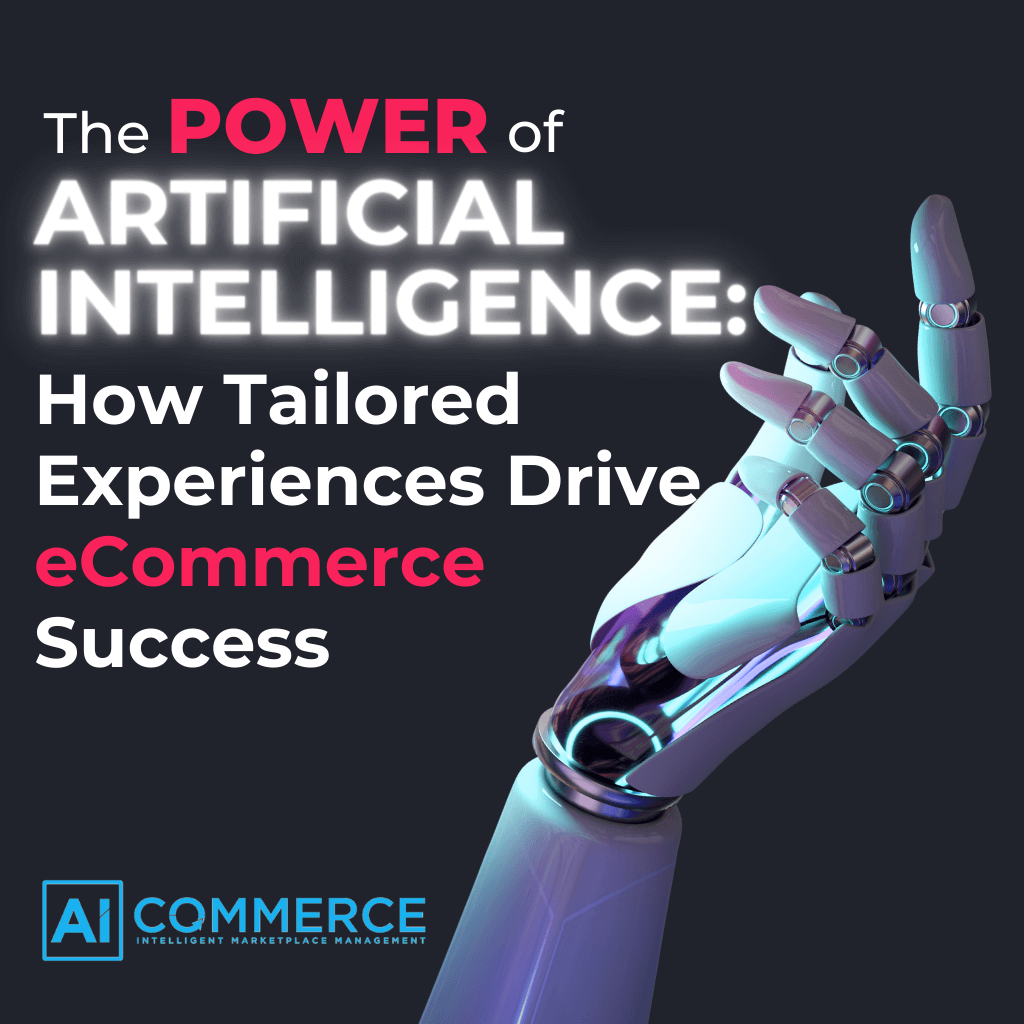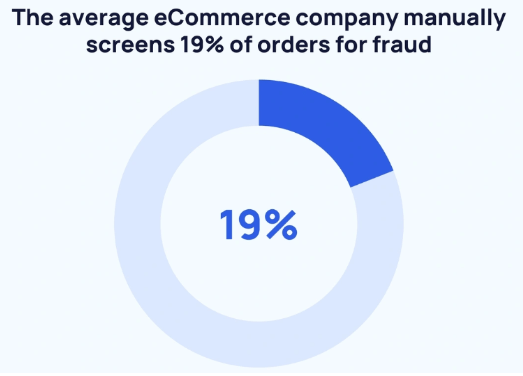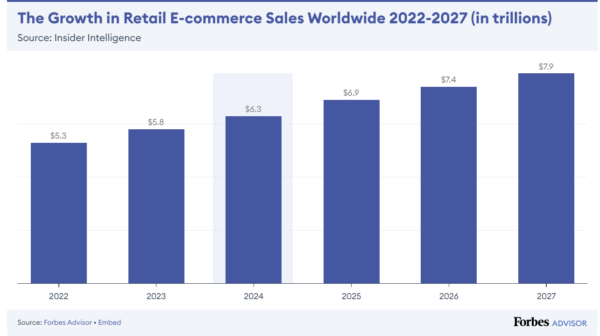
In the realm of eCommerce, where competition is fierce and customer expectations are constantly evolving, the role of artificial intelligence (AI) has become increasingly pivotal. With the exponential growth of online shopping, brands are constantly seeking innovative strategies to stay ahead in the competitive market.
Among these strategies, artificial intelligence (AI) has emerged as a game-changer, revolutionizing how businesses operate, especially in delivering personalized experiences that drive success in online retail. Selling on a platform like Amazon is notoriously challenging due to cutthroat competition. However, AI has been a turning point for many sellers on Amazon, empowering them to leverage personalization and stand out in a crowded marketplace.
Read and discover how AI is revolutionizing online retail, reshaping every facet of the eCommerce journey, as statistics indicate a staggering growth to $16.8 billion by 2030.
The Rise of eCommerce
The global e-commerce market is expected to total $6.3 trillion in 2024 according to statistics soaring to over $7.9 trillion by 2027. The convenience, accessibility, and variety offered by online shopping platforms have fueled this growth, fundamentally altering consumer behavior and preferences. The evolution of technology, coupled with changing consumer preferences and market dynamics, has propelled eCommerce into the forefront of retail.

Today’s consumers demand personalized experiences, seamless transactions, and instant gratification. Understanding their needs and preferences is paramount for brands looking to thrive in the digital marketplace. With the rise of social ecommerce, consumers have access to a wealth of information at their fingertips.
From product specifications and user reviews to price comparisons and recommendations, consumers can conduct thorough research before making purchasing decisions, empowering them to make informed choices. In a digital world, consumers have become increasingly tech-savvy, adept at navigating online shopping platforms, leveraging search engines, social media, and mobile apps to discover new products, connect with brands, and engage with fellow shoppers.
They expect brands to understand their needs and preferences, anticipate their desires, and deliver tailored solutions that resonate with them on a personal level. As a matter of fact, 56% of consumers will become repeat buyers of a brand when they offer personalized experiences. Meeting these expectations is essential for brands looking to thrive in the fiercely competitive digital marketplace.
Leveraging AI for Enhanced Customer Experience
AI-powered recommendation engines utilize advanced algorithms to sift through vast amounts of data, encompassing customer preferences, purchase history, browsing behavior, and demographic information. By leveraging this wealth of data, these recommendation engines craft personalized product suggestions tailored to each individual customer.
Whether it’s suggesting complementary products based on past purchases or highlighting items that align with a customer’s browsing history, these AI-driven recommendations aim to enhance the shopping experience by presenting customers with relevant options that resonate with their unique tastes and preferences. As a result, customers are more likely to find products that genuinely appeal to them, leading to increased satisfaction and a higher likelihood of making repeat purchases.
In addition to recommendation engines, AI-driven chatbots and virtual assistants have revolutionized the way brands engage with customers, particularly in terms of customer support and service. These AI-powered assistants are available round-the-clock, providing instant responses to customer queries, troubleshooting issues, and guiding shoppers through every step of their purchasing journey.
This seamless and efficient interaction not only improves customer satisfaction but also fosters stronger relationships between brands and customers. By providing timely and personalized assistance, brands can build trust and loyalty, ultimately leading to increased customer retention and advocacy.
Optimizing Operations with AI
- Logistics: AI plays a crucial role in enhancing supply chain operations by optimizing logistics, predicting demand, and mitigating risks effectively. One critical aspect of supply chain management is product sourcing, which can be time-consuming and costly for brands. However, partnering with trusted companies like Zignify Global Product Sourcing enables eCommerce brands to streamline their product sourcing processes efficiently.Additionally, logistics costs have been reduced by up to 15% by early AI adopters. Predictive analytics and machine learning algorithms identify inefficiencies, reduce costs, and ensure timely delivery of goods, enhancing overall efficiency and agility.
- Inventory Management: The average inventory accuracy in the US retail industry is 63%. AI-powered inventory management systems automate inventory replenishment, monitor stock levels in real time, and identify slow-moving or obsolete items. By optimizing inventory turnover and minimizing holding costs, brands can improve profitability and customer satisfaction.
- Fraud Detection and Security: eCommerce fraud reached $48 billion in 2023, a $7 billion increase from 2022. While this number is increasing, only a small number of orders can be screened manually, as can be seen in the chart to the right. AI algorithms analyze transaction patterns, detect anomalies, and identify potential fraudulent activities, safeguarding eCommerce platforms from cyber threats and financial fraud. By enhancing security measures, brands can build trust, protect sensitive data, and uphold their reputation.

AI-driven Marketing Strategies
Personalized Shopping Experiences
AI has paved the way for hyper-personalized shopping experiences, a key element in capturing the attention and loyalty of modern consumers. A report from Twilio found that 56% of consumers say they will become repeat buyers from brands that offer personalized shopping experiences.
Utilizing machine learning algorithms, brands can analyze vast amounts of customer data to understand individual preferences, purchase history, and browsing behaviour. This level of personalization not only enhances customer satisfaction but also increases the likelihood of additional sales, fostering a sense of connection between the brand and the consumer.
Visual Search for Enhanced Discovery
Visual search technology is rapidly gaining traction in the eCommerce space, allowing customers to search and discover products using images rather than text. In the example shown below, a customer sees a vase they like, so they take a picture to search for a matching one online. This not only simplifies the search process but also increases the likelihood of conversions by presenting customers with visually similar and appealing alternatives.
Dynamic Pricing Strategies
AI-driven dynamic pricing strategies are reshaping the way brands approach pricing. These algorithms analyze various factors, such as market demand, competitor pricing, and customer behavior, in real-time to dynamically adjust prices.
Dynamic pricing is particularly effective during peak shopping seasons, promotional events, or flash sales. By setting optimal prices based on the current market conditions, brands can attract price-sensitive customers, drive sales, and maintain a competitive edge.
Social Media Integration for Targeted Marketing
AI can enhance social media marketing strategies by analyzing user behavior and preferences to deliver highly targeted and personalized advertisements. Brands can gauge customer reactions to their products and campaigns, allowing for agile adjustments to marketing strategies.
Moreover, AI-driven tools can automate the scheduling and posting of content across various social media platforms, ensuring a consistent and engaging online presence. These integrations not only save time but also enhance the effectiveness of marketing efforts, driving brand visibility and customer engagement.
The Future of AI in eCommerce
Looking ahead, the eCommerce AI market is projected to hit $45.72 billion by 2032, with 84% of eCommerce businesses prioritizing it. Advancements in AI technologies, such as natural language understanding, image recognition, and predictive modeling, will continue to fuel innovation in personalized experiences, marketing automation, supply chain optimization, and more.
Conclusion
Incorporating AI into your strategy may seem daunting, but it’s a crucial step for future growth. If you need assistance with maximizing your AI implementation’s success, consider aiCommerce. Their unique hybrid solution combines human expertise with AI to optimize your brand’s presence and drive success.
As we continue to harness the power of AI technologies, it’s essential to remain vigilant about ethical considerations and ensure that innovation is guided by principles of fairness, transparency, and accountability. By embracing AI responsibly, eCommerce businesses can unlock new levels of efficiency, profitability, and customer satisfaction, shaping the future of online commerce in profound and exciting ways.
About the Author: Krista Becker, Marketing Specialist
Krista Becker is a digital marketing connoisseur, with years of experience across eCommerce, healthcare & transportation. Educated in marketing and business administration and equipped with several digital marketing certifications, she is an expert at crafting meaningful content with a focus on demand generation.
